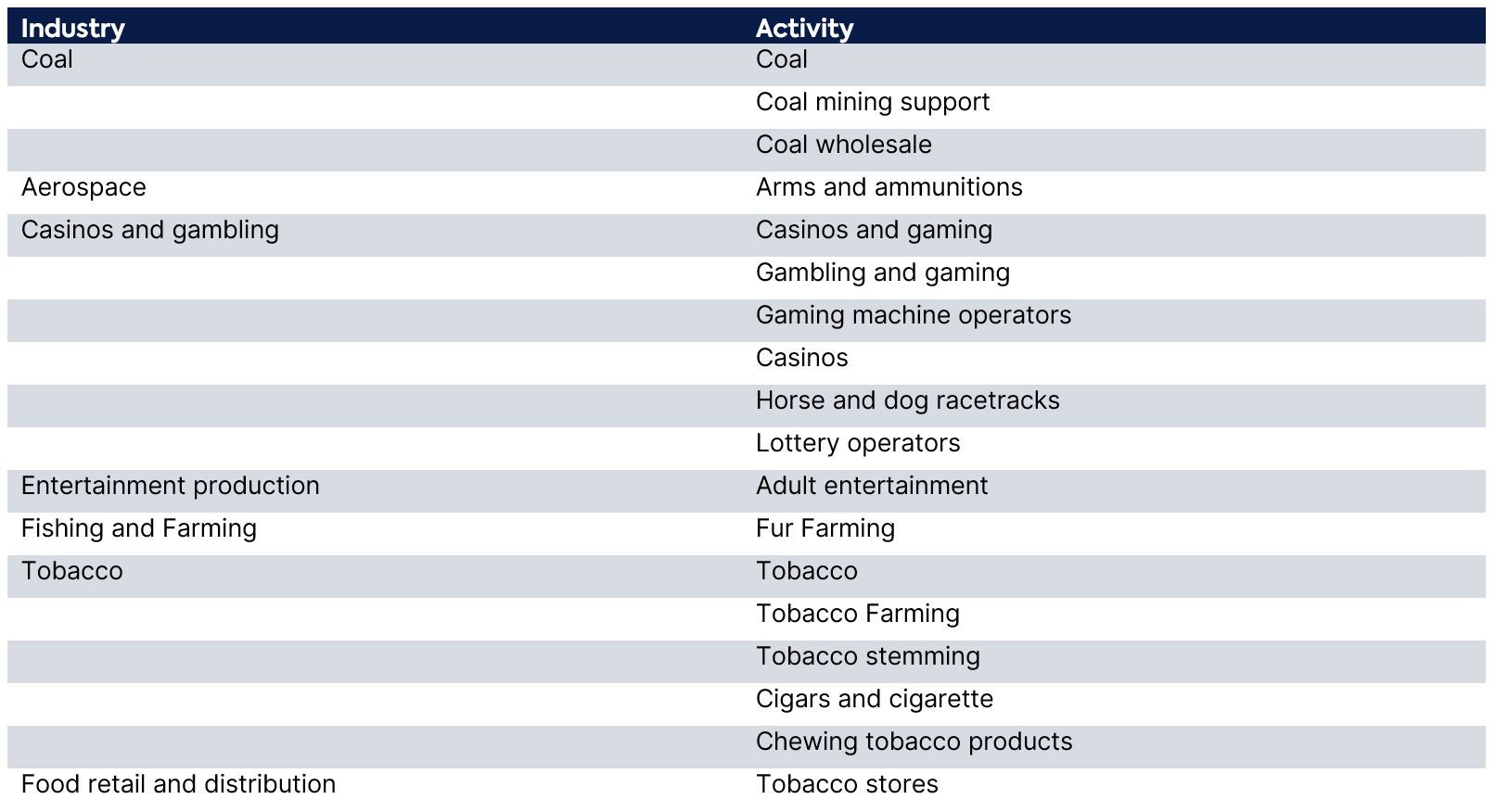Sustainability Information
Juno applies a sector exclusion list for its Funds and Separately Managed Accounts (that are mirrored to its Funds), it applies an additional seven minimum environmental, social and governance (ESG) principles that investments in its investment universe must comply with, and has an active engagement policy. It also considers the principal adverse impacts on a number of sustainability factors it has selected. In Juno's view, these activities qualify as 'promoting sustainable characteristics' and it therefore classifies these products as 'Article 8' under the SFDR.
No sustainable investment objective
This financial product promotes environmental or social characteristics, but does not have as its objective sustainable investment.
Ecological or social characteristics of the financial product
The Promotion of Social and Ecological Characteristics is reflected in the following course of action:
- Exclusion criteria: The Manager considers it important that the companies in which it invests meet minimum ESG standards. To this end, it begins by excluding sectors that do not align with these standards. The Manager maintains a sector exclusion list, which specifies sectors in which the Manager will not invest. For each sector, sub-sectors within an industry are evaluated to determine which specific activities are excluded and which are not. The sector exclusion list is included below.

Additionally, the Manager applies seven minimum ESG principles that a company must meet before being admitted to the Fund's investment universe. This means that, in principle, no cases have been identified where there is evidence of:
1. Systemic involvement in serious lasting environmental damage
2. A violation of fundamental human rights
3. A violation of fundamental labor rights
4. Involvement in controversial weapons, the production and sale of civilian firearms, and/or the supply of military equipment to military regimes
5. Intentional violation of international sanctions
6. Deliberate involvement in fraud, corruption, and tax evasion
7. Insufficient compliance with transparent business operations/external information provision
To assess compliance with these principles, the Manager uses the following definitions:
- Systematic involvement in permanent serious environmental damage: Repeated or structural responsibility for irreversible and significant damage to the environment, such as large-scale soil, water, or air pollution, or the destruction of natural habitats with severe ecological consequences.
- Violations of fundamental human rights: practices that violate individuals' essential rights. This includes torture, slavery, discrimination, and restrictions on freedoms such as expression of opinions and choice of religion.
- Violations of fundamental labor rights: Practices that systematically neglect or undermine basic labor rights. This includes the absence of freedom of association, child labor, forced labor and the deliberate application of discriminatory labor practices.
Before a company is included in the investment universe, the Manager investigates if there are any reports related to potential violations of criteria 1 through 6. For criterion 7, the Manager determines whether companies publish approved (auditor-reviewed) annual and semi-annual reports within legal deadlines and in compliance with minimum legal requirements. Any past violations are further examined. If, in the Manager's opinion, violations have not been adequately addressed or corrected, the company cannot be included in the investment universe.
Once a company is admitted to the investment universe, ongoing monitoring is conducted through Google Alerts and general news monitoring to identify any violations of the criteria. If such violations are identified, the same process as described above is followed for inclusion in the investment universe.
- Adverse impacts: The Manager considers the principal adverse impacts on five sustainability factors it has selected:
- Scope 1 GHG emissions
- Scope 2 GHG emissions
- Share of non-renewable energy consumption and generation
- Employee turnover
- Absenteeism rate
- Engagement: The Manager actively monitors signals that indicate shortcomings in companies its financial products are invested in, concerning the aforementioned ESG criteria. When such signals arise, the Manager engages in dialogue with the company. Signals related to other ESG criteria or developments in adverse impacts on the sustainability criteria it has selected, may also prompt such engagement with these companies.Level of engagement by Juno when incidents have occurred on the above criteria
Investment strategy
Investment strategy to promote E/S characteristics
Companies are only admitted to Juno's investment universe if they do not operate in sectors on the sector exclusion list and if they meet Juno's seven minimum ESG principles. After admission to the investment universe, Juno evaluates at least annually whether the companies still meet these criteria. If incidents occur, Juno follows them up through engagement or by proceeding to sell the position (and/or removal from the investment universe).
Good governance assessment policy
Juno considers sound and transparent corporate governance as essential. Juno looks at both the risks and opportunities resulting from governance structures. The composition of the supervisory board is a primary focus. From this, Juno tries to form an opinion regarding the degree of independence of the supervisory board. After all, an independent supervisory board is better able to form an objective opinion on management decisions and communicate about these. The composition of- and responsibilities within the board of directors are also a focus of attention. As a rule, Juno views high management turnover as risk-increasing. Staff turnover, in relation to the sector in which a company operates, is an important indicator regarding the working conditions and terms of employment as perceived by employees. A persistently high turnover rate and absenteeism is a cause for concern, as it may indicate below-average remuneration, a corporate culture that leaves much to be desired or future prospects that employees perceive to be better elsewhere. Good governance takes into account customers, employees, shareholders but also the wider society. Hence Juno expects its companies to have an acceptable minimum tax rate. High profits due to low taxes may be good for shareholders in the short term but are also deemed a risk for the business in the longer term and thus for all stakeholders.
Share of investments
With its investment strategy, the product aims to align 80% to 100% of its investments with the environmental and social characteristics it promotes. These investments do not take into account the EU taxonomy criteria for environmentally sustainable economic activities. The remaining share of investments falls into the 'other' category. For example, to hold (part of) the assets in cash, as short-term interest-bearing deposits with a reputable bank, or to invest directly in (government) bonds or mutual funds that invest in money market products or bonds.

#1 Aligned with E/S characteristics includes the investments of the financial product used to attain the environmental or social characteristics promoted by the financial product.
#2Other includes the remaining investments of the financial product which are neither aligned with the environmental or social characteristics, nor are qualified as sustainable investments.
- The sub-category #1B Other E/S characteristics covers investments aligned with the environmental or social characteristics that do not qualify as sustainable investments.
Monitoring ecological or social characteristics
Juno evaluates at least annually whether the companies included in the investment universe still meet its ESG criteria. Juno also continuously monitors whether incidents with regard to these criteria occur.
Methodologies used for measurement promote E/S
Annually, Juno determines in retrospect whether the companies in which it has invested have met its ESG criteria. In addition, it determines occurrences related to violations of these ESG criteria and describes what follow-up Juno has given and/or other discussions it has had with companies in which these ESG criteria have been discussed. Finally, Juno measures the main adverse effects of its investment decisions on the sustainability indicators, at the product level.
Data sources and processing for measurement promote E/S
Juno uses the following data sources and providers to measure the achievement of the E/S characteristics it promotes:
- Annual reports and other relevant ESG reporting, such as sustainability reports
- Contact moments with the companies in which it invests or intends to invest
- Press releases
- ESG reports from brokers
- Third Bridge
- LSEG Data & Analytics
- Google alerts
Methodological and data limitations
The reporting of Juno’s investee companies is still evolving. The lack of complete ESG reporting places a limitation on the availability of historical and current data that Juno uses. Juno expects this limitation, prompted in part by legislation that companies must comply with in their reporting, to decrease significantly over time.
Due diligence carried out on the investments
As part of its investment policy, Juno performs an analysis on all companies before including them in its investment universe. Part of this analysis is a verification of whether the company is active in a sector of Juno’s sector exclusion list and whether the company meets its seven ESG criteria. In principle, a visit to the company is part of the due diligence (see description of engagement policy, below).
Description of Engagement Policy
Engagement is an essential component within Juno's selection and monitoring process. A visit to the company's management is part of the screening process that takes place before a company is included, with a clear preference to hold such meetings at the company's premises.
In addition, Juno is in contact with its investee companies several times a year, including personal meetings with management. In this way, Juno builds a steady and good relationship with the company's management and family shareholders. Juno takes a critical stance in these contacts focusing on the long-term sustainable development of the company. This includes compliance with Juno's ESG principles.
Furthermore, in principle, Juno will exercise its statutory voting rights as a shareholder. If opportune, this vote may be used to make clear to the management of the companies how the capital made available by us, can be (better) used to create (economic) value within the organisation concerned. It is not ruled out that in this process, taking into account the legal framework, other shareholders can be actively approached, consulted and joined, in order to obtain more votes to support our beliefs about value creation.
Juno has a very strict selection policy. Should a company no longer meet these investment criteria, Juno engages with the company's management, or if necessary with the Supervisory Board. Should engagement not lead to the desired results, we will in most cases offer our position for sale.
Get in touch
Our clients are always more than welcome to drop in. There is no need for an appointment. Are you considering investing with us and want to know more about what we have to offer? We would love to bring you up to speed.
